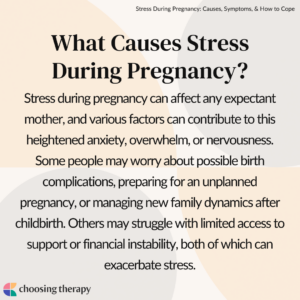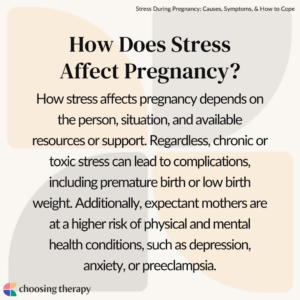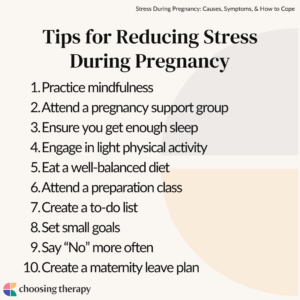Stress during pregnancy is common, with around 78% of expecting women reporting low to moderate stress and 6% reporting high levels of stress.1 What causes this distress varies, but many report financial problems, life transitions, or relationship changes as potential triggers. In some cases, pregnancy stress can lead to birth complications and adverse effects on the unborn baby.
Get support before you burn out!
BetterHelp has over 20,000 licensed therapists who provide convenient and affordable online therapy. BetterHelp starts at $65 per week. Take a Free Online Assessment and get matched with the right therapist for you.
What Causes Stress During Pregnancy?
Stress during pregnancy can affect any expectant mother, and various factors can contribute to this heightened anxiety, overwhelm, or nervousness. Some people may worry about possible birth complications, preparing for an unplanned pregnancy, or managing new family dynamics after childbirth. Others may struggle with limited access to support or financial instability, both of which can exacerbate stress.
Additionally, changing relationship responsibilities can lead to stress while pregnant, as each partner must learn to adapt to a new parental role. For families with many children, expecting mothers may feel overwhelmed by the idea of juggling previous household chores and childcare with a newborn.
Possible causes of stress during pregnancy include:
- Financial stress
- Relationship strain
- Managing appointments
- Fear of pregnancy loss
- Managing as a single parent
- Dealing with an unplanned pregnancy
- Employment changes
- Coping with pregnancy changes and discomfort
- Fears about birth complications
What Types of Stress Affect Pregnancy?
Many types of stress can affect pregnancy, so identifying the root cause is crucial when coping. For example, dealing with pre-existing mental health conditions, death, divorce, or low income can exacerbate or contribute to stress for pregnant women. Additionally, systematic oppression and limited access to healthcare can make for unique challenges others may not understand. Because of this, mothers may feel especially apprehensive about their future and well-being.
Types of stress during pregnancy may include:
- Previous substance use: Women with a history of substance use may experience stress related to the impact of misuse on their health and unborn babies.
- Depression: Pregnant women with depression may experience increased levels of stress, as symptoms can affect their emotional well-being and ability to care for themselves and their babies.
- Anxiety disorders: Anxiety during pregnancy may stem from constant worry and fear about the well-being and health of the baby.
- Negative life transitions: Significant life changes, such as divorce, death, or job loss, can contribute to elevated stress levels during pregnancy, as these transitions can be emotionally challenging.
- Catastrophic events: Experiencing a traumatic event like a natural disaster can lead to considerable stress during pregnancy, as they can disrupt normal routines and create feelings of uncertainty and fear.
- Limited access to healthcare: Women with limited access to healthcare may experience stress related to concerns about adequate prenatal care and proper medical support during their pregnancy.
- Racism: Experiencing racism and discrimination can impact mental health and contribute to negative experiences that may affect the well-being of both the mother and the baby.
- Poverty: Pregnant women living in poverty may experience stress due to challenges in accessing basic needs, financial insecurity, and limited resources.
Self-Care Ideas (most you can try for free)
Want to drink less? Sunnyside App – Free Trial
Want to lose weight? Consult online with a doctor to see if medication may be a good option for you. Visit Plushcare
Want to practice mindfulness and meditation? Mindfulness.com – Free Trial
Symptoms of Stress During Pregnancy
Many women experience stress during pregnancy, but symptoms manifest differently from person to person. While some experience physical symptoms such as nausea and headaches, others may report more mood changes or emotional volatility. Other signs of stress during pregnancy include sleep problems, depression symptoms, and poor concentration.
Symptoms of stress during pregnancy may include:2
- Headaches
- Stomachaches
- Irritability
- Difficulty sleeping
- Low energy
- Lack of pleasure
- Difficulty remembering things
- Rashes
- Low libido
How Does Stress Affect Pregnancy?
How stress affects pregnancy depends on the person, situation, and available resources or support. Regardless, chronic or toxic stress can lead to complications, including premature birth or low birth weight. Additionally, expectant mothers are at a higher risk of physical and mental health conditions, such as depression, anxiety, or preeclampsia.3
Possible effects of stress on pregnant women may include:
- Depression: Dealing with stress during pregnancy can leave mothers feeling emotionally drained, sometimes leading to pre- or postpartum depression.
- Anxiety: Stress can contribute to increased anxiety in pregnant women, leading to feelings of worry, fear, and unease.
- Birth complications: Prolonged or chronic stress during pregnancy may increase the risk of certain birth complications, such as preterm labor, low birth weight, or complications during delivery.
- Miscarriage: Stress alone is unlikely to cause a miscarriage but may be a contributor when combined with other risk factors.
- Unhealthy weight changes: Stress during pregnancy can affect eating habits and lead to either excessive or inadequate weight gain.
- Preeclampsia: High levels of stress during pregnancy may increase the risk of developing preeclampsia, a pregnancy complication characterized by high blood pressure and organ damage.
- Gestational diabetes: Stress can influence blood sugar levels and potentially increase the risk of developing gestational diabetes, a type of diabetes that occurs during pregnancy.
Post-Traumatic Stress & Pregnancy
Pregnancy can be a challenging and emotional time for any woman. However, the impact can be more significant for those who have experienced a traumatic event. Post-traumatic stress disorder (PTSD) can result in intrusive thoughts, flashbacks, anxiety, and hypervigilance that can be especially distressing during pregnancy.
The presence of post-traumatic stress during pregnancy can have several effects, including difficulties in bonding with the baby and an increased risk of preterm birth or low birth weight. Pregnant women with PTSD may experience heightened anxiety surrounding childbirth and may require additional support and resources to help navigate these challenges.
Can Stress During Pregnancy Affect Babies Later in Life?
Babies exposed to stress in utero are more likely to have childhood diseases and major congenital malformations, which are defects that affect the structure or functioning of specific body parts.3 Pregnant women who experience heightened stress are also less likely to be proactive about their health, possibly leading to smoking, substance use, an unhealthy diet, or excessive caffeine consumption. All of these behaviors can have harmful effects on the baby.
Lower Your Stress & Avoid Burnout!
Therapy can help. BetterHelp has over 20,000 licensed therapists who provide convenient and affordable online therapy. BetterHelp starts at $65 per week. Take a Free Online Assessment and get matched with the right therapist for you.
10 Tips for Reducing Stress During Pregnancy
While most people experience stress throughout their pregnancy, allowing negative emotions to grow without intervention is unhealthy. Fortunately, you can learn stress management skills to cope with challenges as they occur. Taking care of yourself and seeking support are beneficial when determining how to handle stress while pregnant.
Here are ten tips for reducing stress during pregnancy:
1. Practice Mindfulness
Mindfulness is the practice of present-moment awareness without judgment. You could follow formal meditations or engage in breathwork throughout the day. Several studies show these exercises can help reduce depression, anxiety, and stress during pregnancy.4 Expectant mothers may develop more self-acceptance, less reactive responses to stress, and empowerment about labor.
You can practice mindfulness in several ways, such as watching a video online, using a mindfulness-based app, or taking a meditation class. Alternatively, you can find a quiet space, get comfortable, and breathe deeply. Instead of judging yourself for any negative thoughts that arise, redirect your attention back to the present moment.
2. Attend a Pregnancy Support Group
Support groups can provide a safe space to share your thoughts with people facing similar experiences. They also allow you to give and receive advice from others. This community can help you feel supported and validated as you deal with the many stressors associated with pregnancy and parenthood. In fact, one study found having more support during pregnancy was linked to lower rates of postpartum depression.5
Depending on your availability and resources, you may consider local in-person or online support groups. Online groups can be helpful if you feel anxious about attending meetings, prefer at-home support, or have multiple responsibilities that impede your ability to seek care. Either way, finding a supportive network can be beneficial.
3. Ensure You Get Enough Sleep
Pregnancy can lead to overall discomfort or frequent trips to the restroom throughout the night, thus disrupting sleep and restfulness. Other times, stressed moms may struggle with racing thoughts and anxiety that keep them awake. Unfortunately, poor sleep can affect mental health, especially when coping with stress while pregnant.
Practice good sleep hygiene to help you fall and stay asleep. For example, avoid caffeine, sugar, and large meals before bed and ensure your sleeping area is calm, dark, and quiet. Additionally, create a bedtime routine that includes laying down and waking up around the same time every day, even on weekends. Fixing your sleep schedule allows your body time to recharge so you feel equipped to deal with stress.
4. Engage in Light Physical Activity
Exercise during pregnancy can benefit your physical and mental health. Physically active women show lower rates of depression during pregnancy and after birth, and many see exercise as a natural stress relief and self-care activity.6
Consult your doctor before incorporating exercise into your routine. Experts often recommend moderate exercise for beginners or moderate to high intensity for previously active mothers.6 You can consider low-impact activities like walking, prenatal pilates or yoga, or lightweight training. Remember to monitor how you feel while exercising and avoid exerting yourself to exhaustion. If something feels uncomfortable, take it easy.
5. Eat a Well-Balanced Diet
People feel better when they eat a healthier diet, which can help them more effectively handle stressful situations. For instance, omega-3 fatty acids may help lower stress during pregnancy.7 You can find these healthy fats in salmon, walnuts, flaxseed, and chia seeds.
Physicians generally recommend a diet of healthy fats, whole-grain carbohydrates, fruits, and vegetables. Pregnant women should also avoid alcohol, high levels of caffeine, high mercury-containing fish, and foods that increase the risk for foodborne illnesses.7 Consult your doctor to ensure you get sufficient nutrients and vitamins to feel your best.
6. Attend a Preparation Class
For some women, stress during pregnancy stems from uncertainty about the future. Some may feel overwhelmed thinking about labor, delivery, or caring for a newborn. To ease your concerns, consider attending a class to help you feel more positive and confident about motherhood.8
Many hospitals, birthing centers, or local midwives host classes to educate expecting parents. While most groups are in-person, you may find some online courses. Either way, you can learn more about what to anticipate so you feel more confident moving forward in your pregnancy.
Get support before you burn out!
BetterHelp has over 20,000 licensed therapists who provide convenient and affordable online therapy. BetterHelp starts at $65 per week. Take a Free Online Assessment and get matched with the right therapist for you.
7. Create a To-Do List
Pregnant women often report feeling like they have “so much to do” and “not enough time.” Parents must complete many tasks before a baby arrives, but many women struggle to take action due to overwhelm and stress. A big challenge is not knowing how much time you have before delivery.
However, making a to-do list of everything you must prepare, purchase, or prioritize before birth can help ease anxiety. Take time to jot down when to set up the nursery, register for baby gifts, or baby-proof your home. Once you have a list, indicate which tasks are most urgent and which ones can wait until after the baby is born. For example, having a crib is essential, but buying baby gates can wait.
8. Set Small Goals
Once you prioritize your pre-birth responsibilities, start setting healthy goals. Tackling a long to-do list can be overwhelming, especially when pregnant. Consider focusing on one task at a time to avoid undue stress. However, ensure these goals are attainable. Remember, what you could accomplish before pregnancy may not be realistic now. Avoid shaming yourself and practice self-compassion. And don’t be afraid to ask for help.
9. Say “No” More Often
Mental and emotional stress during pregnancy can leave you feeling even more tired or worn down. Moreover, taking on too many responsibilities can lead to burnout, especially if you are a people-pleaser. Learning to say “no” can significantly improve your ability to prevent additional stress.
Saying no does not make you a bad person or parent. Instead, you model healthy self-care and awareness to others. Politely refusing favors, invites, or suggestions can help ensure you avoid overextending yourself and creating more stress as you navigate pregnancy.
10. Create a Maternity Leave Plan
Work and finances are sources of stress during pregnancy for many women. Figuring out your maternity leave, how to delegate responsibilities, how to transition back, and how to manage finances can be overwhelming.
However, creating a solid plan can help you feel stable as your due date nears. For example, consider who will handle your job in your absence by collaborating with your colleagues. Ask others for feedback if you feel uneasy or want additional advice.
When to Seek Help for Stress During Pregnancy
Determining how much stress is too much when pregnant is impossible because everyone has a unique experience as an expectant parent. However, you should consider seeking professional support if symptoms impact your ability to function.
Therapy for stress provides opportunities to talk about your feelings and learn healthier ways to deal with challenges. Additionally, some mothers benefit from couples counseling if stress affects their relationships. Regardless of the treatment type, you can use an online therapist directory to locate a provider specializing in women’s issues, stress management, or life transitions. Help is available–don’t wait until stress becomes unbearable.
Below are signs to seek professional support for stress during pregnancy:
- Intense, overwhelming feelings of anxiety or sadness that persist or worsen over time
- Difficulty coping with daily stressors
- Feeling unable to relax or take pleasure in activities
- Changes in sleep patterns, such as insomnia or excessive sleeping
- Persistent physical symptoms (i.e., headaches, stomachaches, or chronic pain)
- Recurrent intrusive thoughts or flashbacks of past traumatic events
- Increased relationship problems or conflicts with partners, family members, or friends
- Deterioration in self-care habits, neglecting personal hygiene, or changes in appetite
- Constant worry or obsessive thoughts about the baby’s well-being and health
- Thoughts of self-harm or suicidal ideation
- Feeling socially isolated or disconnected from others
- Difficulty bonding with the baby or feeling emotionally distant
- Significant mood changes (i.e., excessive irritability or feeling emotionally numb)
- Loss of interest in previously enjoyed activities
- General lack of motivation
- Difficulty concentrating or making decisions
- Substance abuse or self-destructive actions
Additional Resources
To help our readers take the next step in their mental health journey, Choosing Therapy has partnered with leaders in mental health and wellness. Choosing Therapy is compensated for marketing by the companies included below.
Talk Therapy
Online-Therapy.com – Get support and guidance from a licensed therapist. Online-Therapy.com provides 45 minutes weekly video sessions and unlimited text messaging with your therapist for only $64/week. Get Started
Virtual Psychiatry
Hims / Hers If you’re living with anxiety or depression, finding the right medication match may make all the difference. Connect with a licensed healthcare provider in just 12 – 48 hours. Explore FDA-approved treatment options and get free shipping, if prescribed. No insurance required. Get Started
Anxiety Newsletter
A free newsletter from Choosing Therapy for those impacted by anxiety. Get helpful tips and the latest information. Sign Up
Learn Mindfulness, Meditation, & Relaxation Techniques
Mindfulness.com – Change your life by practicing mindfulness. In a few minutes a day, you can start developing mindfulness and meditation skills. Free Trial
Choosing Therapy Directory
You can search for therapists by specialty, experience, insurance, or price, and location. Find a therapist today.
In My Experience
Online Stress Test A few questions from Talkiatry can help you understand your symptoms and give you a recommendation for what to do next. Best Online Therapy Services There are a number of factors to consider when trying to determine which online therapy platform is going to be the best fit for you. It’s important to be mindful of what each platform costs, the services they provide you with, their providers’ training and level of expertise, and several other important criteria.









